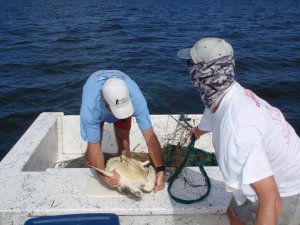Grant: 09-050R
Project Title: Assessment of Marine Turtle Aggregations in the Coastal Waters of Lee County, Florida
Project Manager: Dr. Jeff Schmid
Organization: The Conservancy of Southwest Florida (Non-Profit Organization)
Grant Amount: $32,849.01
Completion Date: 2011-06-23
Summary: In-water surveys will be conducted one week monthly to collect wild marine turtles foraging in nearshore waters of Lee Co., Florida. Per protocols used in the Ten Thousand Islands (Witzell and Schmid, 2004), turtles will be captured with a 200 m strike net with 20 cm stretch-mesh nylon webbing, braided polyfoam float line, and braided leadcore line. The strike net used in this former study has recently been acquired by Florida Wildlife Research Institute (FWRI) and was used last spring in a training session for FWRI and Mote staff on strike netting methods. However, the net is showing its age and is in need of replacement. The net was continually mended due to the damage caused by sharks and stingrays during intensive sampling in the Ten Thousand Islands, but the time and effort needed to adequately repair the webbing is no longer cost-effective. Furthermore, the polypropylene cork line is deteriorating from years of exposure to the sun and saltwater. Funds are being requested for the materials needed to construct a new strike net and for operational costs to conduct in-water sampling. The purpose of the proposed in-water sampling is to characterize the aggregations of marine turtles inhabiting the waters of Pine Island Sound, San Carlos Bay, Estero Bay and adjacent Gulf waters. Results: The relatively large number of sightings and captures in Pine Island Sound reinforce the importance of the Charlotte Harbor estuary as marine turtle developmental habitat, particularly for the critically endangered Kempís ridley turtle. Preliminary examination of Kempís ridley fecal samples has revealed that spider crabs are the primary component in their diet. The isotope composition of Kempís ridleys will be compared to those of their prey and habitat components in one of the first and most comprehensive investigations into the trophic ecology of this species. Tag recaptures and satellite tracking data suggest that Kempís ridleys exhibit both short-term and long-term fidelity to Lee County waters but further in-water surveys are needed to compare with the results of other west Florida studies. Tracking efforts will be expanded in the following years to provide a better understanding of how Kemp's ridleys use Charlotte Harbor estuary and surrounding waters.
Results: The relatively large number of sightings and captures in Pine Island Sound reinforce the importance of the Charlotte Harbor estuary as marine turtle developmental habitat, particularly for the critically endangered Kempís ridley turtle. Preliminary examination of Kempís ridley fecal samples has revealed that spider crabs are the primary component in their diet. The isotope composition of Kempís ridleys will be compared to those of their prey and habitat components in one of the first and most comprehensive investigations into the trophic ecology of this species. Tag recaptures and satellite tracking data suggest that Kempís ridleys exhibit both short-term and long-term fidelity to Lee County waters but further in-water surveys are needed to compare with the results of other west Florida studies. Tracking efforts will be expanded in the following years to provide a better understanding of how Kemp's ridleys use Charlotte Harbor estuary and surrounding waters.
Full Final Report (pdf)